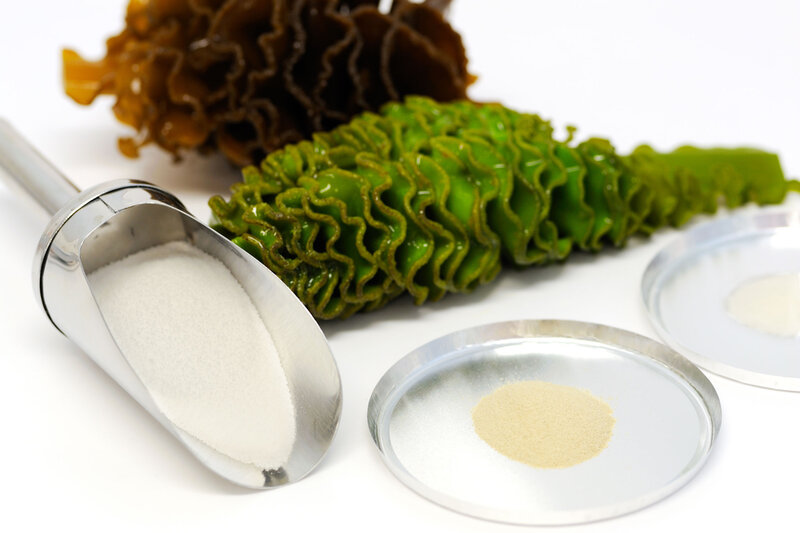KEYWORDS
Fucoidan
Algae
Seaweed
Microbiome
Gut health
Functional ingredients
Abstract
Fucoidans are non-gelling, fucose-rich sulfated polysaccharides found primarily in brown seaweeds. They are highly bioactive compounds that play a pivotal role in protecting seaweed from water-borne pathogens and other environmental challenges. Extensive research has shown that fucoidans impart significant beneficial effects in a wide range of human health settings. This overview explores recent scientific research behind fucoidans from brown seaweeds Undaria pinnatifida and Fucus vesiculosus in the context of gut health. Recent (2025) findings are highlighted, adding to the growing body of evidence attesting to the ability of fucoidans to support human gut health.
Introduction
Fucoidans have different chemical structures and bioactivities depending upon the species of seaweed from which they are derived, and the method by which they are extracted (1,2,3). Fucoidans from Undaria pinnatifida and Fucus vesiculosus are among thosethat have been extensively researched and clinically tested. Undaria pinnatifida, commonly known as wakame, yields a fucoidan extract which is acetylated and rich in galactose. In comparison, fucoidan extracts from Fucus vesiculosus have a very high fucose content and are not acetylated.
Manufacturers of fucoidans have traditionally utilised solvents to precipitate the fucoidan polymer from crude seaweed extracts (1,2). The use of solvents, such as ethanol, may lead to contaminants being present in the final extract. Furthermore, the quality of fucoidans manufactured in this way can be inconsistent, their chemical integrity may be compromised and – most importantly – their bioactivity may be diminished. Today, leading fucoidan suppliers utilise green chemistry extraction methods to overcome these problems, producing fucoidan extracts that remain unadulterated in chemical structure and free from solvent residues. High purity, certified organic fucoidan extracts with global regulatory acceptance are now in high demand from leading nutritional brands (4).
More than 4,000 published research papers now attest to the bioactive properties of this intriguing class of natural compounds. This research includes a significant number of studies investigating the benefits of fucoidans on gut health (5). A growing body of evidence demonstrates the potential of fucoidans from Undaria pinnatifida and Fucus vesiculosus to support human gut microbiome.

The brown seaweed Fucus vesiculosus
Balancing beneficial and harmful bacteria
Studies have demonstrated that fucoidan from Undaria pinnatifida can assist in balancing gut flora by promoting the growth of naturally occurring beneficial bacteria and reducing the growth of harmful bacteria. For example, a recent study showed an increase in the abundance of beneficial gut bacteria, including Bacteroides/Prevotella, Akkermansia muciniphila and Lactobacillus in mice (6). In the same study, fucoidan reduced the Firmicutes/Bacteroides ratio. This ratio is a widely accepted indicator of gut health, reflecting the relative abundance of the two largest bacterial phyla. Similarly, in other mouse models, Undaria pinnatifida fucoidan has been shown to positively modulate the gut microbiome (7, 8, 9).
Diet and gut bacteria
High-fat diets are known to alter the composition of the human gut microbiome, often resulting in a decrease in beneficial bacteria and an increase in potentially harmful bacteria. An imbalance in the gut microbiome can lead to a range of gastrointestinal problems, including disruption to gut barrier function, metabolic disorders and inflammatory conditions (10). In addition to exploring gut microbiome composition, each of the aforementioned studies also explored potential diet-related effects of Undaria pinnatifida fucoidan. These studies compared mice fed a standard chow diet to mice fed a high-fat diet. In all cases, fucoidan supplementation positively modulated the gut microbiota in both groups, however the effects were stronger in mice consuming high-fat diets. Given the widespread prevalence of high-fat diets in the Western world, these findings may be of particular interest to formulators seeking ingredients to support the gut health of today’s consumers.
Short-chain fatty acids
Short-chain fatty acids are known to play an important role in maintaining gut health (11, 12). They are produced by the gut microbiome as dietary fibre is fermented and assist in the regulation of a number of key functions, including supporting the gut barrier, stimulating the production of protective mucus, and in nutrient absorption.
The colonic microbiota has been shown to metabolise non-digestible dietary fibre, such as fucoidans, and produce substantial amounts of short-chain fatty acids (13). In animal models, fucoidans from both Undaria pinnatifida and Fucus vesiculosus have been shown to increase the production of key short-chain fatty acids, including acetate, propionate and butyrate (9, 14).
Reducing gut inflammation
In a range of studies, fucoidans from Undaria pinnatifida and Fucus vesiculosus have been shown to reduce gut inflammation, suggesting potential to support gastrointestinal inflammatory conditions (14, 15). Intestinal inflammation can be triggered by a fibre deficient diet, contributing to an imbalance in the gut microbiome and in intestinal mucus layers. In mice fed a fibre-deficient diet, supplementation with Undaria pinnatifida fucoidan was shown to contribute to anti-inflammatory activity by modulating gut microbiota and protecting intestinal barrier integrity (16).

Spotlight on latest findings
A recently published study has extended scientific understanding of the significant gut health benefits of fucoidan derived from Undaria pinnatifida. The study utilised a validated in vitro gut model to explore the effects of high purity Undaria pinnatifida fucoidan on human colonic microbiome (17).
Faecal samples from healthy human donors were treated daily for three weeks with high purity Undaria pinnatifida fucoidan. Colonic microbiome activity and composition were both assessed, along with quantification of short chain fatty acids. The study also assessed secretions of anti-inflammatory cytokines.
The study found Undaria pinnatifida fucoidan supplementation enriched colonic microbial diversity. Species richness and species evenness were positively enhanced in both the proximal and distal colon. Fucoidan supplementation significantly increased levels of the short-chain fatty acid butyrate, known to assist in the maintenance of the gut barrier, stimulate gut motility and modulate both innate and adaptive immune responses. Further, colonic fermentation induced the secretion of anti-inflammatory cytokines in both the proximal and distal colon.
The authors of the paper concluded that ‘Undaria pinnatifida fucoidan may provide significant benefits to gut health.’ They also highlighted the beneficial effects of repeat dosing, noting that previous in vitro studies have utilised faecal fermentation for up to 48 hours only. In this latest study, new insights are provided via a well-established model running over an extended period, thereby simulating physiological conditions.

High purity fucoidan
Fucoidan sourcing recommendations
For those unfamiliar with fucoidan, it can be difficult to know what to ask a potential fucoidan supplier and what to be aware of in the current market. A reputable fucoidan supplier should provide clear answers to the following questions:
1. Is it the fucoidan extract certified organic?
2. What seaweed is it derived from?
3. Where and how is the seaweed sourced?
4. Is the supply chain secure and sustainable?
5. What is the extraction process?
6. What is the purity of the extract?
7. Where is the supporting science?
8. What quality controls are in place?
9. Does the extract comply with global regulations?
10. What is the company's track record with fucoidan?
Conclusion
With fucoidans increasingly demonstrating a wide range of benefits for gut health, exciting opportunities exist to incorporate them into innovative nutritional products. Typically supplied as dry powders, high purity fucoidans are versatile ingredients that are easy to formulate with. They can be utilised as stand-alone bioactives or readily incorporated with other ingredients. They are ideal ingredients for capsules, pressed tablets, bulk supplement powders, medical devices, gels, creams, serums and functional foods and beverages.
References and notes
- Fitton JH, Stringer DN, Karpiniec SS. Therapies from fucoidan: An update. Mar Drugs. 2015;13(9):5920–46.
- Garcia-Vaquero M, Rajauria G, O’Doherty J V., Sweeney T. Polysaccharides from macroalgae: Recent advances, innovative technologies and challenges in extraction and purification. Food Research International. 2017 Sep 1;99:1011–20.
- Ferreira SS, Passos CP, Madureira P, Vilanova M, Coimbra MA. Structure-function relationships of immunostimulatory polysaccharides: A review. Vol. 132, Carbohydrate Polymers. Elsevier Ltd; 2015. p. 378–96.
- Europe Fucoidan Market Size, Share & COVID-19 Impact Analysis, By Form (Powder, Capsule, and Others), By Application (Pharmaceutical, Dietary Supplements, and Cosmetics), and Country Forecast, 2025-2032. Fortune Business Insights. 2025 https://www.fortunebusinessinsights.com/europe-fucoidan-market-107877
- Scopus
- Yang C, Dwan C, Wimmer BC, Wilson R, Johnson L, Caruso V. Fucoidan from Undaria pinnatifida enhances exercise performance and increases the abundance of beneficial gut bacteria in mice. Mar Drugs. 2024;22(11):485.
- Liu M, Ma L, Chen Q, Zhang P, Chen C, Jia L, et al. Fucoidan alleviates dyslipidemia and modulates gut microbiota in high-fat diet-induced mice. J Funct Foods. 2018;48:220–7
- Huang J, Huang J, Li Y, Lv H, Yin T, Fan S, et al. Fucoidan protects against high-fat diet-induced obesity and modulates gut microbiota in institute of cancer research mice. J Med Food. 2021;24(10):1058–67.
- Zheng W, Jia J, Zhang C, Zhang P, Song S, Ai C. Undaria pinnatifida fucoidan ameliorates dietary fiber deficiency-induced inflammation and lipid abnormality by modulating mucosal microbiota and protecting intestinal barrier integrity. Int J Biol Macromol. 2023;247:125724.
- Mamun MA Al, Rakib A, Mandal M, Singh UP. Impact of a high-fat diet on the gut microbiome: A comprehensive study of microbial and metabolite shifts during obesity. Cells. 2025 Mar 20;14(6):463.
- Blaak EE, Canfora EE, Theis S, Frost G, Groen AK, Mithieux G, et al. Short chain fatty acids in human gut and metabolic health. Benef Microbes. 2020 Sep 1;11(5):411–55.
- Cong J, Zhou P, Zhang R. Intestinal microbiota-derived short chain fatty acids in host health and disease. Nutrients. 2022 May 9;14(9):1977.
- Sun T, Xue M, Yang J, Pei Z, Zhang N, Qin K, et al. Metabolic regulation mechanism of fucoidan via intestinal microecology in diseases. J Sci Food Agric. 2021;(November 2020).
- Liu X, Zhang Y, Li W, Zhang B, Yin J, Liuqi S, et al. Fucoidan ameliorated dextran sulfate sodium-induced ulcerative colitis by modulating gut microbiota and bile acid metabolism. J Agric Food Chem. 2022 Nov 30;70(47):14864–76.
- Lean QY, Eri RD, Fitton JH, Patel RP, Gueven N. Fucoidan extracts ameliorate acute colitis. PLoS One. 2015;10(6):1–18.
- Zheng W, Jia J, Tang S, Song S, Ai C. Undaria pinnatifida fucoidan contributes to anti-inflammation activity of Bacteroides in fiber-deficient mice via modulation of gut microbiota and protection of intestinal barrier integrity. Int J Biol Macromol. 2023;252:126256.
- Wimmer BC, Dwan C, De Medts J, Duysburgh C, Rotsaert C, Marzorati M. Undaria pinnatifida fucoidan enhances gut microbiome, butyrate production, and exerts anti-inflammatory effects in an in vitro short-term SHIME® coupled to a caco-2/THP-1 co-culture Model. Mar Drugs. 2025 Jun 4;23(6):242.


